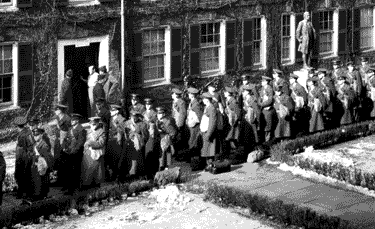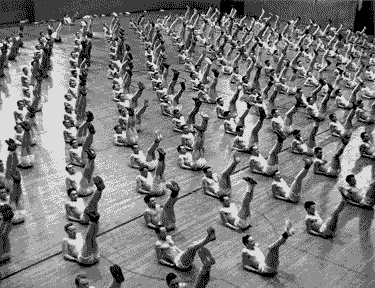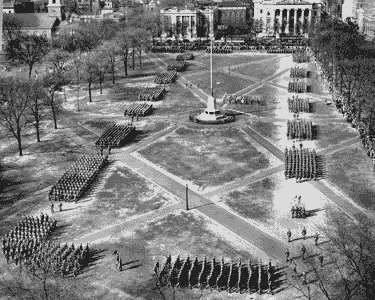Comment on this article
When Yale Went to War
The familiar rhythm of life at Yale changed overnight after the attack on Pearl Harbor, as the university prepared for “total conversion to war.” Excerpts from a forthcoming book by Richard Nash Gould ’68, ’72MArch, recall those days with words and images of the time.
May/June 2004
by Mark Alden Branch ’86
Richard Nash Gould ’68, ’72MArch, is something of a war buff. Gould, a New York architect and one of the creators of the ephemeral “Tribute In Light” memorial to the victims of the World Trade Center attacks, says he owns about 200 books on World War II. So when his project to document the history of the Whiffenpoofs evolved into an elaborate two-volume opus on Yale in the last century, the university’s experiences in war were central.
Gould’s privately published work, which he hopes to have printed by the fall, comprises a volume of Whiffenpoof history, four CDs of historic Whiffenpoof recordings, and a “history in present time” that tells the story of Yale in the 1900s strictly through images from the time and excerpts from publications and other contemporary texts. The result is a glimpse of history from the point of view of those who didn’t know how it was going to turn out.
Gould worked more or less chronologically through the project. (Ironically, he is still struggling to find the right images from the last 20 years, which don’t tend to be well archived at Yale—photographers of that era can contact him at rng@rngarchitects.com.) He says that by the time he got to World War II, he “had an idea about what the book was going to mean.” The history of the twentieth century, he thought, was dominated by sacrifices made for a better, more peaceful world for future generations. (His own father, Richard Nash Gould ’41, died in 1954 of complications from the dengue fever he contracted in the South Pacific in the Navy in World War II.) He planned to close the book with an idyllic photo he had taken in the spring of 2001 of students on the Old Campus. “I was going to caption it ‘The Peaceable Kingdom,’ because that’s what everybody had been fighting for: so these young people could find themselves without the stresses and uncertainty of war,” he says. “Then the planes hit the buildings, and it had to start all over again.”

All the texts and photos are from sources of the 1940s and appear in Richard Nash Gould’s forthcoming book Yale College Twentieth Century: A History in Present Time.
Obligation Undeferred
The nation … has declared that no students shall be called for military service until the academic year is over. While garage men, artists, waiters, brokers, men our age of all callings, will be asked to leave their work, we are permitted to study. Never before was such a high value placed upon the business of learning. Before, our education was a personal investment, now it is a national obligation. For the first time we are not only accountable to the University and ourselves, but to the whole nation. And not in spite of, but because of the doubts about what may happen to us, it is put up to us to prove that we deserve the extraordinary privileges of the present.
Yale Daily News
23 Sept 1940

Traditional Yale Republicanism Gives Willkie Nearly 3–1 Margin
A careful tabulation of Yale’s own Gallup poll conducted by the News last night shows … Wendell L. Willkie the overwhelming choice over Franklin D. Roosevelt by a count of 1,457 to 592.
Yale Daily News
31 Oct 1940

Corporation Approves Speed-up Program
At a meeting Saturday, the Yale Corporation put its stamp of approval on plans for the accelerated scholastic program which will alter profoundly the whole complexion of undergraduate life for some time to come. In terms of the new schedule, degrees will be awarded after two years and eight months of study.
Yale Daily News
12 Jan 1942


New arrivals in the Army Air Force Technical training program line up alongside Nathan Hale, 1943.

Hume Criticizes Jap Evacuation
Speaking at a recent informal cabinet meeting of Dwight Hall the Rev. Theodore C. Hume ’25 declared that the bottleneck of Japanese resettlement on the West Coast, if not remedied, would lead to a national calamity. The Rev. Mr. Hume said that the forced migration of 70,000 citizens to the desert areas of Arizona and California has created “an explosive situation.”. Mr. Hume emphasized that evacuation in some form was justified as a military necessity since a small number of subversive agents were undoubtedly present, but he felt that the suffering of a large number of American citizens was undemocratic.
Yale Daily News
17 July 1942

Tulagi 15 August 1942
Sitting here in the little lean-to, Tulagi seems as a South Sea Island should seem. The day is hot and moist. No breeze stirs the trees, but we have the memory of yesterday’s sun and its brilliant coloring still with us … Across the water are the mountains of Guadalcanal and behind them the Coral Sea with other Solomon Islands protecting the bay. But before the eye reaches the water’s edge, it must cross the beach and on the beach lie the dead … The graves are numbered individually, a dirty wooden cross marks the plot so that amphibian tractors will not tear the ground under which the Marines are buried.
Lieutenant Paul Moore Jr. ’41, USMC
Yale Alumni Magazine
Nov 1942


Morning calisthenics at Payne Whitney Gymnasium, circa 1943.

Shoe Rationing Starts
The allowance is established at three pairs per person per year. Manufacturers must limit their products to four colors: black, white, town brown, and army russet. Patent leather shoes, two-toned shoes, leather-wasting straps, and trimmings are all prohibited.
Yale Daily News
8 Feb 1943

Devane Predicts New Curtailment of Activities
A drastic curtailment of all extracurricular activities upon Yale’s “total conversion to war” was foreseen by Dean William DeVane of Yale College in his remarks on WOCD last night.
Yale Daily News
19 Feb 1943


V-12 drill on the Green, 1945.

Air Corps, During Six Months Stay, Has Made University Strictly “GI”
A 180-day siege by the Army Air Forces Technical Training Commandos has already metamorphosed Yale into a college whose curriculum is death and destruction.
Yale Daily News
3 July 1943

Whiffenpoofs Disband
One of the brightest of Yale legends has taken a temporary departure from the realms of undergraduate life. The Whiffenpoofs, for 36 years the premier intimate singing group in the university, have disbanded until the war is over.
Yale News Digest
7 Oct 1943

14,491 Yale Men Now Serving
Casualties come to 218.
Yale News Digest
1 April 1944

Memorial Service
Victory in Europe was observed Tuesday noon in Woolsey Hall with a simple service of commemoration and a “reconsecration” by President Charles Seymour “to the ideals for which our soldiers have been fighting and dying.”
Yale News Digest
11 May 1945

|




